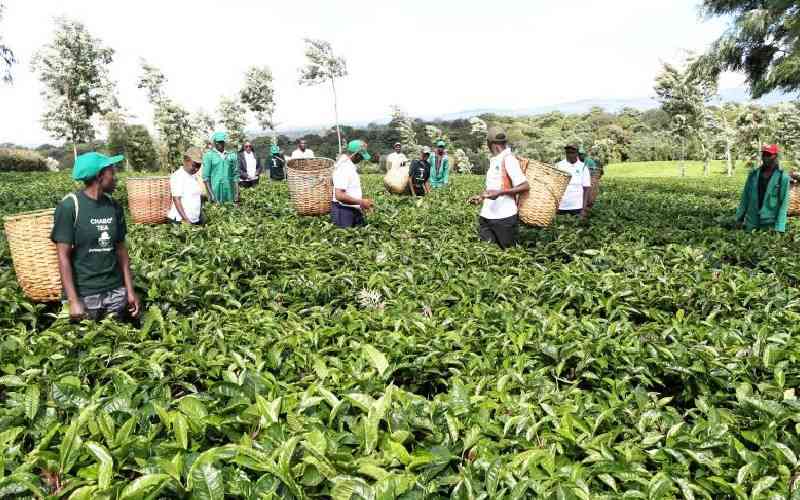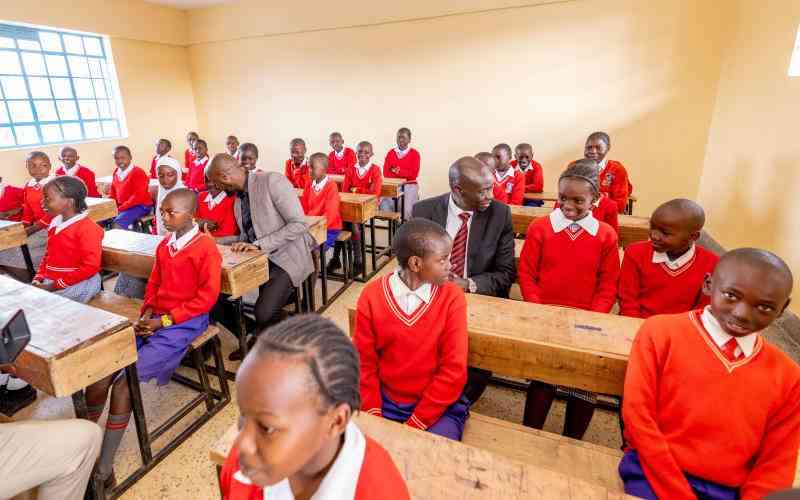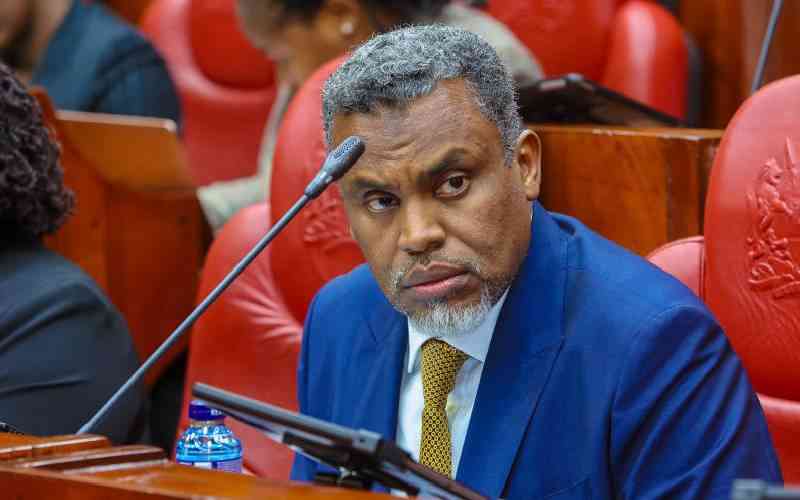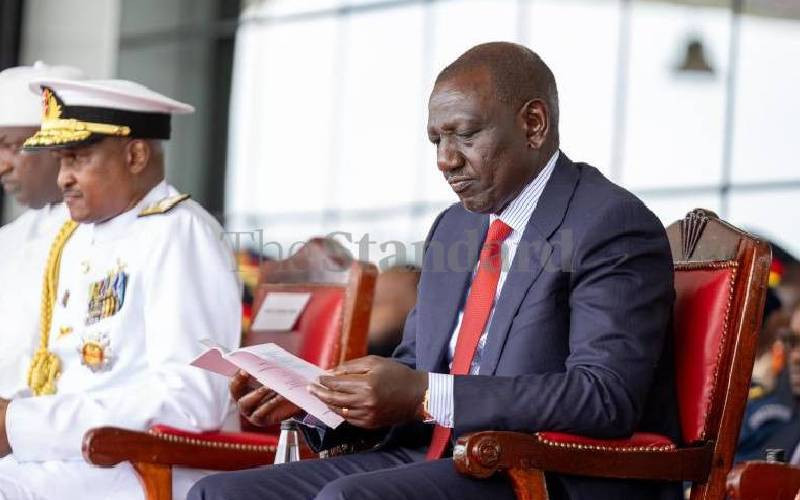
Today, I will spell out the areas that my administration intends to focus on over the next few months. The primary thrust of that strategy is economic. I want the economy to be a more important focus than politics. And this is because our practice throughout our history has been to pursue the political kingdom as opposed to the economic kingdom. But that focus has been wrong. It is the reason we still have remnants of poverty despite the years of progress we have made.
Political power pursued for its own sake will not make us the great nation we want to become. We must, therefore, use politics to shift the economy and address the plight of the most vulnerable members of our society. We must use politics to better the livelihoods of Kenyans. If we use politics as a means to a greater end, we will give politics meaning. And this is my intent for this year.
On the first area of focus to revitalize our economy so as to increase circulation of money in the economy.
The removal of the interest rate cap in November last year will facilitate the availability of more credit to businesses which will in turn increase the circulation of money. I urge the Central Bank to use the full range of instruments of regulation and policy at its disposal to prevent predatory lending and ensure that banks can offer loans at affordable interest rates.
Micro, Small and Medium Enterprises (MSMEs) are the lifeblood of our economy. The sector accounts for more than 80 percent of all businesses in Kenya, create around 75 percent of the jobs and are key contributors to broad-based and inclusive economic growth. But MSMEs face many challenges, which reduce their competitiveness and constrain their growth and sustainability.
As a result, the contribution of MSMEs to the country’s gross domestic product (GDP) is only 30 percent, a figure that could be much higher if we were to realise their full potential.
We are, therefore, putting several measures in place to re-start this powerful engine of our economy. They include:
Increasing access to affordable credit: Measures to enable MSMEs access affordable credit include the recently launched Stawi. This will provide unsecured credit to MSMEs, which, because of their informal nature and lack of collateral securities, had been locked out of the formal credit market.
Five commercial banks have set aside 10 billion shillings to be lent to MSMEs at an interest rate of 9 percent per annum, in loan amounts ranging between 30, 000 to 250,000 shillings.
Partnership between the government and MSMEs in the construction industry to provide doors and windows for the affordable housing programme.
My second intent for the year is to increase the money in the pocket of the farmer. This will be achieved by directing our anti-corruption efforts against those managing the agricultural sector and exploiting their positions for illegal gain and trading in conflict of interest. I am also directing action to increase the revenues to the farmer as opposed to the middle men and brokers.
Kenya remains a leading exporter of Black tea, accounting for nearly 20 percent of total global exports. However, lately, the industry has been experiencing difficulties, particularly with regard to diminished earnings for the farmers. The following actions will be taken to address these concerns:
Pricing policy and mechanisms for smallholder farmers. The key concerns are on low tea prices, delayed payments, low initial payment by Kenya Tea Development Agency (KTDA) Ltd and fluctuations in net income of tea farmers.
KTDA has delivered a lot of value to farmers in the past but some operational and governance challenges have emerged in the last few years. Key among these is conflict of interest by directors and lack of clarity in the declaration of dividends by subsidiary companies. It is clear the governance of KTDA and entire marketing of tea will require to be restructured if we are to assure our tea farmers get more revenue from their tea sales.
Stay informed. Subscribe to our newsletter
Empirical evidence abounds; as a result of poor corporate governance farmers who would be earning about Sh91 per kilo for their tea, are currently earning about Sh41 with Sh50 shillings per kilo going to brokers and middle men.
I hereby, direct the Competition Authority to take decisive and conclusive action to bring these practices to an end. I further direct the Ministry of Agriculture and the Ministry of Trade to take immediate measures to ensure that each of the subsidiaries has separate Governance structures; and that the profits from each of the subsidiaries is reflected in farmers’ incomes.
For the longest time in the history of tea farming in Kenya, farmers would deliver their tea to tea buying centres, from where it was collected for delivery to the tea factories.
In the context of market liberalisation, farmers have the option of selling their tea to whomever they choose. The concern here is that certain people have taken advantage of this option to exploit farmers.
These middlemen, variously known as “soko-huru” or “mukohoro”, purchase tea from the farmers on a cash-on-delivery basis, and then sell it to KTDA in their own names. I direct the ministry of agriculture to ensure that the Tea Regulations 2019 incorporate appropriate mechanisms to ensure that, no one who is not a registered tea grower is allowed to sell it. I further direct the Ministry of Agriculture to immediately explore the option of KTDA paying farmers no less than 50% of their deliveries as monthly payments with the balance being paid as annual bonus.
Value Addition: In 2018, Kenya exported 476 million kilograms of tea, earning Sh140 billion. Sri Lanka on the other hand exported 288 million kilos, which is about 60% of our exports. However, they earned an equivalent of Sh150 billion.
The higher earning for lesser tea than ours is largely due to their ability to export close to 50% percent of their teas in value added form, compared to us who export 98% of our tea in bulk form.
To earn more value from our tea, we need to add value to it before exporting it. Going forward, I have directed the National Treasury, the Ministry of Trade and Industry, the Ministry of Agriculture and the Attorney General to finalise and gazette the newly developed Tea Regulations (2019) within the next two weeks.
These regulations include establishment of the Green Leaf Pricing Formula Committee to determine the formula for pricing of green leaf; the establishment of a self-sustaining stabilisation fund to cushion farmers against price fluctuations and ensure implementation of guaranteed minimum returns; establishment of Kenya Tea Council; and regulation of the volume of teas sold through the Auction and through Direct Sales/ Direct Contracts to be set at 80% Auction and 20% Direct Sales window.
The same problems of governance, conflict of interest, unscrupulous buying methods that are bedeviling our tea sector are very similar to those in the coffee sector. The Coffee Task Force, which I established in 2016, completed its work and I am aware that the recommendations have not been implemented. I direct the Ministry of Agriculture to immediately implement the Task Force recommendations.
In addition to the above measures, for the coffee sector, I have directed the National Treasury to immediately operationalise the Sh3 billion Cherry Revolving Fund within the next 30 days to cushion farmers from delayed payments, and enable them to the access finances to meet their daily cash flow requirements whilst awaiting payments for their produce.
My third intent is to support producers and makers of entertainment. And this intent is both medium and long-term in outlook. In particular, I will focus on milk, potatoes, rice and banana producers in the agricultural sector and producers in the music and entertainment sectors.
I have directed the National Treasury to release Sh500 million to the new KCC to purchase excess milk from farmers to convert it into powder milk for future use.
Two, I have directed the National Treasury to release a further Sh575 million to new KCC for two milk plants, one in Nyeri and one in Nyahururu, to enhance their processing capacity. In sum, my intent is to boost the milk industry with Sh1.07 billion in the immediate run as a way of supporting their efforts.
Three, and to protect our milk producers from illegal imports, I have directed the National Treasury to impose 16% VAT on milk products that have originated from outside the EAC. I have further directed KEBSs, Customs and the DCI to impound any powdered milk or milk products that does not meet Kenyan standards.
Our potato, banana and rice farmers have been blessed with bumper harvests. And because their products are perishable in nature, they suffer immense loses when they cannot sell them on time.
As part of my intent and support to producers of perishable goods, I have issued two practice directions.
One, I have directed that the National Treasury to release Sh300 million to the Micro and Small Enterprises Authority for the construction of cold storage and processing facilities in Nyandarua, Meru and Kisii.
Two, I have directed that the National Treasury releases Sh660 million to the Kenya National Trading Corporation to purchase all the excess rice from Kano Plains and Mwea for onward selling to our disciplined forces, prisons services as well as our boarding schools. The two regions experienced bumper harvests and found themselves with excess rice in their stores.
Producers in the entertainment industry are also a critical plank of our economy. Kenyans are highly talented and the music industry is potentially one of the most lucrative. Hundreds of our young men and women have invested an incredible amount of effort in the industry but are getting very low returns from their investment. We must allow their investments to pay off so that many more can follow them into one of the industries that we can do exceptionally well in.
Following numerous complaints from the producers in the industry, I directed the Ministry of ICT to work with all stakeholders to resolve the legacy issues that have plagued rights holders for decades.
I am pleased to note that progress has been made and an agreement has been reached between all the key stakeholders. The MoU signed on December 20, 2019 proposes a range of measures that will ensure genuine rights holders are appropriately compensated for their compositions.
Regarding Content Service Providers, my intent is to support the sector using a multi-pronged approach. Content Service Providers who work with digital platforms such as SKIZA and Viusasa, will be eliminated. And this is because they sit outside the Collection Management Organisations. My practical direction on this is to have all rights holders register on the National Rights Registry.
To receive royalties, Content Service Providers will be required to channel all payments of royalties through a single, centrally managed account at the Kenya Copyright Board. This will enable oversight by the regulator and ensure that the collection and distribution accounts are easily auditable.
The Kenya Copyrights Board, with assistance of the Ministry of ICT, has already reviewed and agreed on the Tariffs for 2020. These tariffs are to be gazetted and will form the basis on which compliance will be monitored. In this regard, I direct the Ministry of ICT, in consultation with the AG’s office, to ensure the tariffs are gazetted within the next 30 days.
Further, I direct the Ministry to remove conditions requiring digital platform to only work through licensed Content Service Providers. This will enable musicians to work directly with platforms such as Sikiza.
I further direct the Ministry of Interior, Ministry of Tourism and Wildlife, and Ministry of ICT to ensure that public service vehicles, the hospitality industry, and broadcasters respectively, meet all their obligations in paying the required tariffs. This will be a basic requirement for renewal of any business licences for the broadcasting houses, matatus, hotels, bars and other such premises.
These new measures will see the rise of tariffs collected and will create immense savings on the processes of collecting royalties. It is estimated that the new system will see an increase in collections from a previous Sh. 200m per year to an estimated 2 billion shillings per year, a tenfold increase.
My third intention is to provide support to Kenyans afflicted by natural disasters such as the recent floods and the ongoing locust invasion.
My administration has mobilised funds and made available Sh5.2 billion to provide relief food supplies, undertake a resettlement programme for the displaced communities, support reconstruction of homes that have been destroyed, address health concerns and reconstruct critical infrastructure, including water supplies.
I am aware of proposed changes in the fees and structure of insurance benefits of the NHIF. Given my administration’s commitment to providing affordable health care, I am directing the Ministry of Health to immediately halt the implementation of this proposal to allow for further consultation.
My fourth intent speaks to the issue of corruption. Fellow Kenyans, I want to renew my pledge to you on this fight. I will not turn to the right or to the left. I will not soft-pedal or backpedal. I will make no covenants with evil doers or show mercy to those who rig our markets to enrich themselves.
As we soldier on in this fight, I seek the indulgence of the Judiciary. And I do so because no administration in the history of this country has prosecuted corruption cases the way I have.
From ministers to governors, senior government officers to procurement officers, I have been on the front line. And since I respect the principle of separation of powers, I have no powers of convicting the accused. I have done my part. And I will continue to do so.
Now the Judiciary should give us convictions as an indication that we are winning in this war. And to that extent I think it is a shame on our country that we prosecuted a case against drug traffickers and we could not get a conviction and within a year of them being arraigned in the United States they have been jailed for no less than 25 years. That is something that our Judiciary must come to terms with.
That said, however, I must note that my fight against corruption has given me one joyous result – deterrence! Public officers are now reluctant to engage in corrupt practices because they are afraid. And instead of dealing with corruption after it has happened, our fight against corruption has ensured that we fight it at source.
More must be done. I direct the NIS to undertake a rigorous review of all cartel groupings that have become leeches sucking away the blood and sweat of hardworking Kenyans.
I want the review to pay particular attention to cartels operating in the public systems of budgeting, procurement, regulation and the illegal rigging of markets. It should also put the agricultural sector under the microscope.
Once this review is completed, I further direct the DCI to take necessary action, working alongside the DPP, to confront these cartels with every instrument available.
Finally, the sixth intent is political. We must give ourselves a different political template if we are to truly prosper and not be dragged down by never ending squabbling.
Every so often, the nation must come together and renegotiate its nationhood. We did it in Lancaster in the 1960s leading to the Lancaster Consensus. We did it in the 1990s, then in 2008.
It is time for a new consensus. We are doing it through the BBI process. In this process of renegotiation, no voice will be wrong and all will be heard. The BBI process is inclusive, it should spell the end of ethnic majoritarianism.
It will be the end of winner-take-all politics. We are on a path to end the cycles of election crises. This is the only path to winning the economic kingdom.
The above outlined actions are just but the beginning. I want you to hold me accountable for delivering these intentions, and I want every leader in the country, at every level, to stand and work to make the lives of our people better and more hopeful. Over the next few months, I shall be coming to you with further actions.
 The Standard Group Plc is a
multi-media organization with investments in media platforms spanning newspaper
print operations, television, radio broadcasting, digital and online services. The
Standard Group is recognized as a leading multi-media house in Kenya with a key
influence in matters of national and international interest.
The Standard Group Plc is a
multi-media organization with investments in media platforms spanning newspaper
print operations, television, radio broadcasting, digital and online services. The
Standard Group is recognized as a leading multi-media house in Kenya with a key
influence in matters of national and international interest.
 The Standard Group Plc is a
multi-media organization with investments in media platforms spanning newspaper
print operations, television, radio broadcasting, digital and online services. The
Standard Group is recognized as a leading multi-media house in Kenya with a key
influence in matters of national and international interest.
The Standard Group Plc is a
multi-media organization with investments in media platforms spanning newspaper
print operations, television, radio broadcasting, digital and online services. The
Standard Group is recognized as a leading multi-media house in Kenya with a key
influence in matters of national and international interest.









